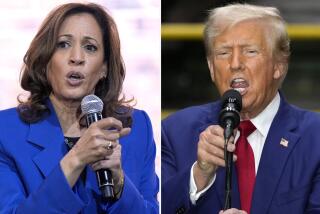Gore Rejects Bush Offer on Three Debates
- Share via
AUSTIN, Texas — George W. Bush, the Republican presidential nominee, agreed Sunday to three prime-time debates with his Democratic rival Al Gore starting next week, but the vice president immediately rejected the proposal.
Bush offered a joint appearance Sept. 12 on a special evening edition of NBC’s “Meet the Press;” another one on CNN’s “Larry King Live,” and finally a debate sponsored by the bipartisan commission that has managed every general election presidential debate since 1988. The vice presidential contenders would also debate twice.
Gore charged that the offer was a ploy to limit the number of viewers because the television networks would be more inclined to broadcast a debate hosted by the neutral commission rather than a competing network.
But Texas Gov. Bush said it would “give the American people an opportunity to see the candidates in a wide range of locations and formats.”
“My opponent said he’ll debate me any time, any place, and he’s accepted the debates that I am accepting today,” Bush told reporters in Austin.
Bush’s challenge was more than just the latest volley in a dispute over debates.
It comes at a time when Bush is under pressure from opinion polls that show Gore gaining ground. This week, Bush will attempt to recapture his edge by sharpening policy contrasts with Gore and releasing his prescription drug plan for the elderly on Tuesday.
The debate challenge was also an attempt to undermine Gore’s credibility, the same tactic used in a Republican Party television ad that mocks the vice president for raising money at a Buddhist temple and taking some credit for inventing the Internet.
On the lawn of the governor’s mansion here, Bush smiled as aides played a videotape of Gore on a monitor near his podium. It showed Gore accepting debate invitations from Larry King and “Meet the Press” host Tim Russert.
“Would you be willing to host one of the first debates, Larry?” Gore asks King. “Absolutely,” King responds. “Of course.” “Well, I accept,” Gore says. “I accept.”
After playing the tape, Bush said, “It’s important for the American people to be able to trust the next president to keep his commitments, and therefore I take Al Gore at his word that he will be there.”
Gore has accepted invitations from CNN and NBC along with 43 other proposals, according to his spokesman, Douglas Hattaway. But Gore’s condition for attending any of the debates is that Bush first agree to attend the three commission debates.
At a campaign stop in Philadelphia on Sunday, Gore said he was “very disappointed” in Bush’s offer.
“What’s needed is to respect the right of the American people to see these debates on all networks in prime time, the way it’s been done since 1988,” he said. “It’s not fair to the American people to try to sharply reduce the number of people who can see the debates and reduce the amount of time for the debates.”
Gore campaign chairman Bill Daley added that “no candidate should arrogantly insist on debating only where and when it best suits him.”
The Gore campaign says the commission debates would be seen by millions more viewers than the ones proposed by Bush, and they would also last longer. The NBC and CNN shows are each an hour long, while the commission debates would be 90 minutes.
The Gore campaign also notes that the commission’s proposed debates are available to any broadcaster, and all the major networks have carried them in past elections, drawing tens of millions of viewers.
Bush aides said NBC and CNN have agreed to let other networks show their debates, but the Gore campaign said they did not expect them to do so.
Bush denied his proposal was aimed at limiting viewership. He cited considerations such as diverse geography. “Meet the Press” would be broadcast Sept. 12 from Washington; “Larry King” on Oct. 3 from Los Angeles and the commission debate Oct. 17 from St. Louis.
“I thought we ought to have one on the West Coast,” Bush said. “I think it’s important to be in a city like Los Angeles.”
One of the vice presidential debates between Democratic nominee Joseph I. Lieberman and GOP nominee Dick Cheney was scheduled for Oct. 11 in Winston-Salem, N.C. A time and place for the second meeting was not specified by Bush.
The debate offer kicked off a week in which the Bush camp will try to regain momentum by sharpening policy contrasts with Gore.
The effort’s centerpiece will come on Tuesday in Pennsylvania, when Bush is scheduled to release his plan to reform Medicare and provide prescription drugs to seniors. Gore recently has lambasted Bush for not offering a specific drug plan, while his campaign has been running ads pledging to provide one.
Sources say Bush is likely to propose a two-step response on the prescription drug issue. In the first phase, Bush is likely to propose state grants to subsidize prescription drug coverage for low-income seniors. That plan would build on the programs 22 states have launched to help low-income seniors buy medications, GOP sources said.
In the second phase, Bush will propose incorporating prescription drug benefits into Medicare as part of more sweeping reforms. Today, most seniors receive care under the traditional Medicare program in which the government directly compensates doctors and hospitals. Bush has endorsed a plan that would instead provide seniors a fixed sum of money to purchase health insurance from a range of providers, some of which would be required to offer prescription drug coverage.
Bush and other advocates maintain that approach would provide seniors with more choice and save the government money by encouraging competition among HMOs bidding for Medicare business.
Though some details are likely to differ, the plan closely follows a bipartisan proposal sponsored by Sen. John B. Breaux (D-La.) and Sen. Bill Frist (R-Tenn.). Breaux and Frist, though, have had difficulty attracting Senate support for their initiative and have been forced to scale back the provisions in it meant to save money. Their difficulty suggests that Bush could also have trouble building support for these reforms if he wins.
If Bush follows this route, Democrats are likely to claim that his short-term response will not cover enough seniors who need help obtaining prescription drugs. And Gore has already denounced the long-term Breaux-Frist reforms that Bush has praised.
Democrats are also poised to question how Bush will pay for this benefit. His aides say he can fund the plan with money from the surplus combined with the expected savings from the broader Breaux-Frist reforms. But Gore, who has proposed a competing $253-billion plan to provide a prescription drug benefit to all seniors under Medicare, is certain to argue that Bush’s proposed cut in income tax rates will leave him without enough money to fulfill his promises to seniors.
*
Times staff writer Edwin Chen contributed to this story.
More to Read
Get the L.A. Times Politics newsletter
Deeply reported insights into legislation, politics and policy from Sacramento, Washington and beyond. In your inbox twice per week.
You may occasionally receive promotional content from the Los Angeles Times.











